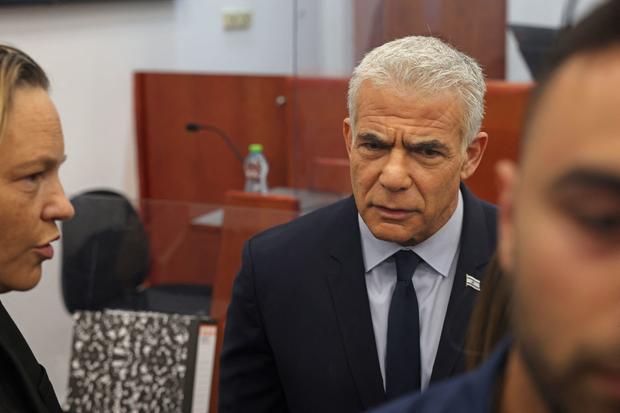Israeli PM Benjamin Netanyahu accused in corruption trial of pushing legislation to help Hollywood friend
Jerusalem — Israel’s opposition leader testified Monday that Prime Minister Benjamin Netanyahu had twice tried to persuade him to back legislation that would have given a Hollywood mogul millions in tax breaks. But Yair Lapid, a former prime minister himself and a major Netanyahu rival, said he was not convinced.
Lapid made the statements as he testified in Jerusalem in one of three corruption cases against Netanyahu. The indictment claims Netanyahu used his position of power to further Hollywood mogul Arnon Milchan’s interests in exchange for gifts, representing a conflict between the premier’s public duties and personal friendship.
MENAHEM KAHANA/POOL/AFP/Getty
Netanyahu did personal favors for Milchan, including asking U.S. officials to extend Milchan’s U.S. resident’s permit and extending Israeli regulations exempting Israeli returnees from declaring foreign income, according to the indictment.
Lapid testified Monday that Milchan and his attorneys had tried first without success to persuade him that extending the tax breaks for a decade would be good for Israel, Israeli media reported. Then Netanyahu broached the matter twice with Lapid, he testified, once at the prime minister’s residence and once outside a cabinet meeting, according to the reports.
Lapid said he told Netanyahu that it wasn’t going to happen, and the prime minister responded that it was “a good law.”
MENAHEM KAHANA/AFP/Getty
Netanyahu, Israel’s longest-serving leader, denies claims of wrongdoing, saying he was not acting in Milchan’s personal interests and even occasionally acted against them. He’s said the exchanges of gifts were just friendly gestures.
Milchan is expected to testify in the case in a video call from London, where he resides, sometime later this month.
The Haaretz newspaper has reported that in 2013 Lapid, then finance minister, sought legal advice on the possibility of promoting the legislation that would have benefitted Milchan. Earlier, Lapid had reportedly said he replied, “no way,” to Netanyahu and Milchan about the prospects for the legislation.
Netanyahu is charged with fraud, breach of trust and accepting bribes in three separate scandals involving powerful media moguls and wealthy associates. He denies wrongdoing.
The corruption charges have been at the center of a protracted political crisis that sent Israelis to the polls five times in less than four years — each vote essentially a referendum on Netanyahu’s fitness to rule. After losing power in 2021 to a coalition of opponents, Netanyahu returned as prime minister late last year, despite his legal problems, after forming a coalition with some of Israel’s most controversial, far-right parties and politicians.
Under Israeli law, the prime minister has no obligation to step aside while on trial.
The trial, which began in May 2020, has featured more than 40 prosecution witnesses, including some of Netanyahu’s closest former confidants who turned against the premier. Witness accounts have shed light not only on the three cases but also revealed sensational details about Netanyahu’s character and his family’s reputation for living off the largesse of taxpayers and wealthy supporters.
Critics accuse Netanyahu of striving to weaken the nation’s courts and change the judicial system as a way to open an escape route from his trial, claims he’s also dismissed as untrue.
In an April interview for CBS’ “Face the Nation,” Netanyahu told Margaret Brennan that a huge national backlash sparked by the controversial judicial reforms proposed by his government, which have drawn regular, large-scale public protests, was an “internal matter that we have to resolve.”
“I think there’s a broad consensus that we have to make corrections in our judicial system,” Netanyahu said. “There’s obviously a dramatic difference between the views of how, to what extent, and so on.”
Protests against the proposed reforms, which critics have decried as undemocratic, have taken place regularly on Saturdays since Jan. 7, drawing hundreds of thousands of Israelis onto the streets. The proposed reforms include an “override clause” which would remove the only check to the power of lawmakers in Israel — allowing a majority in the legislative body to pass any law and override any decisions to strike it down.
U.S. President Biden said in March that he was “concerned” by Netanyahu’s actions and called on him to walk away from the overhaul.
For all the latest Automobiles News Click Here
For the latest news and updates, follow us on Google News.



